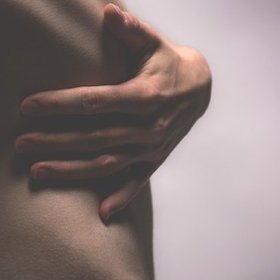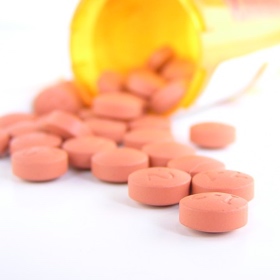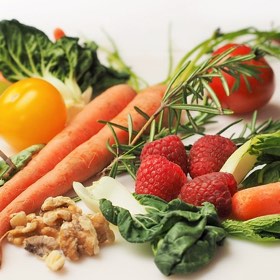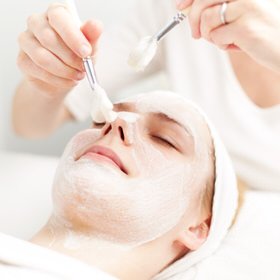The Gut and its connection to Acne.
The amount of information that can be found on the Internet these days is crazy and can quite often leave you feeling stressed and even more confused. I hope that by the time you finish reading this, you will get a clearer picture of the connection between the gut and acne, plus what you can do to help your skin.
As the saying goes, Life isn’t fair… One of those injustices is when things flare up, your skin becomes hellish and you start feeling down, but with a few tweaks and with a little bit of patience, I promise you that things can start looking brighter and better.
Take my advice and make a plan for your skin. Forget everything that you’ve done so far and start afresh!
You don’t have to be too hippie about it but; you need to reflect on everything that is going on in your body. Look at your every day diet, your sleep, exercise and stress levels.
Next look at the products that you use. What do they have in them? Are they adding to the problem? Plus what facial treatments are you using, if any?
What have hormones got to do with it?
Most cases of adult acne occur in women. It’s thought that many cases of adult acne are caused by the changes in hormone levels that many women have at certain times. What’s going on for you internally is usually what makes the biggest impact to your skin, but of course external factors are also important
Here is some good news for you…Hormonal Acne can be treated!
 To start with, the increase of testosterone produced during adolescence, stimulates the sebaceous glands of the skin to enlarge, which generates lots of oil and cloggs up pores. The result is a break out of pimples. They can get red and angry and usually appear around the chin, jawline and neck. They usually start as blackheads and white heads and then gradually turn into pustules or cysts.
To start with, the increase of testosterone produced during adolescence, stimulates the sebaceous glands of the skin to enlarge, which generates lots of oil and cloggs up pores. The result is a break out of pimples. They can get red and angry and usually appear around the chin, jawline and neck. They usually start as blackheads and white heads and then gradually turn into pustules or cysts.
This process often happens before or during one’s period, after starting or just finishing the pill, during extreme stress, plus later during perimenopause. Polycystic Ovary Syndrome is something that can cause breakouts too.
Poor liver function is the result of hormone imbalances and/or gut problems, not the cause, so it’s important to figure out what the root cause is. However, there are lots of things you can do to help support your liver while you work on your gut and hormone levels. Reishi and Milk Thistle are great liver supporting herbs, which you can include in your diet.
So why not start taking action by going and asking your GP for a hormonal test to find out what’s happening inside?
If something feels wrong, trust your gut.
 Studies have shown that both stress and gut inflammation can impair the integrity and protective function of the epidermal barrier. This in turn leads to a decrease in antimicrobial peptides produced in the skin, and an increase in the severity of infection and inflammation in the skin.
Studies have shown that both stress and gut inflammation can impair the integrity and protective function of the epidermal barrier. This in turn leads to a decrease in antimicrobial peptides produced in the skin, and an increase in the severity of infection and inflammation in the skin.
Heal your skin by healing your gut first!!
A diet of highly processed foods and refined sugars can cause poor gut function and negatively impact your skin. As your body struggles to deal with high levels of sugar in your diet, your skin bares the brunt.
To improve your gut health, cutting these processed foods out is so important. Only then can your body properly eliminate waste products in the gut. I recommend starting this off by cutting down on sugars and ensuring that you are eating quality proteins with each meal. This will help to balance your blood sugar levels.
Going dairy free for those suffering with Acne can be advantageous, as unfermented dairy is associated with acne. However, the consumption of fermented dairy products can improve clinical aspects of acne over a 12week period.
So, go and get some yoghurt or kefir to add to your diet.
What else can contribute to Acne?
Other triggers for acne can be medications such as steroids, anti-depressant drugs or anti-epilepsy drugs, plus some comedonic cosmetic products.
 Of course, some prescribed medications are important to keep taking. However, I highly advise Not to go on antibiotics like Accutane or Roaccutane for you acne, because it can take up to 6 months before you start getting clearer skin and even then the results are not permanent, so once again… you are not addressing the root cause.
Of course, some prescribed medications are important to keep taking. However, I highly advise Not to go on antibiotics like Accutane or Roaccutane for you acne, because it can take up to 6 months before you start getting clearer skin and even then the results are not permanent, so once again… you are not addressing the root cause.
Some consider using The Pill (contraceptive) as an acne treatment. Unfortunately though it can cause problems for the skin when you decide to come off of it and your skin can end up worse than before, so please consider this option with caution.
Plus if you smoke, now is the time to let the beast go. Your skin will thank you for it.
Jumping from one diet to another or using different products (which haven’t been recommended by your skin therapist) could be the error that is affecting your skin negatively.
When revamping your skin routine, the first 6 months can be the hardest and sometimes you will notice only the smallest of improvements, so perseverance is key. Nothing happens overnight!! Stick with it. You are worth the effort.
Pregnancy Acne is quite common too. Normally women start getting breakouts after the 6th week of pregnancy. Hormonal surges of Progesterone cause your glands to secrete more oil (sebum), clogging up your pores, causing bacterial build up which leads to breakouts. On top of that your body retains fluid, which contain toxins that can lead to spots. To find out more about Pregnancy and gut health read our resident Nutritionist’s article here. If you would like to book in a facial, bare in mind that the treatment requires you to be able to lay flat on your back, so if you are pregnant, we advise you to have a facial in your first trimester, as it may be too uncomfortable after that.
So…here is what you need to do!
1). Start with a regular cleansing of your skin on a daily basis. Use a gentle cleanser morning and evening. Exfoliate in the morning only. Use an oil-free moisturiser with at least an SPF of 30. (For guidance on skin product ingredients see below.)
 2). Book yourself for an hour deep cleansing facial and talk to your skin therapist.
2). Book yourself for an hour deep cleansing facial and talk to your skin therapist.
We at Shine recommend the Dermalogica Customised Facial.
3). Eat smart ! – get rid of sugar, refined grains, any unhealthy fats and red meat.
4). Stay clear of beta-hydroxy acid and salicylic acid in the cosmetics you use.
Lets talk more about products
With the right combination of skin treatments and in more severe cases a strict diet you can help manage, prevent, and treat your breakouts. The first place to start is with formulas that focus on specific ingredients known to lessen the inflammation. These include a very low percentage of salicylic acid and products including Retinol (no higher than 0.5% for home use.)
Some people would recommend benzoyl peroxide, but I personally think that if you use too much of it, you can dry out your skin too much and your body will start overproducing oil to compensate, so I would avoid it. Anything containing zinc is great for your skin.
Cleansers are not going to be very effective at combatting acne if they don’t stay on your skin for very long, so make sure you leave them on for at least a minute and then rinse them off. Exfoliants are a must, as you need to get rid of the build up of dead skin cells, but always make sure they are very gentle. Those in the form of a mask or very fine granules like the Dermlaogica “Daily Microfoliant” (our best seller) are very good. Again remember to leave it on for at least a minute to get to work.
An oil free moisturiser with an SPF is a must.
Try to think outside the box: Your skin is not only oily/breakout/acne prone/, but it is sensitive at the same time. When prescribing home care to my clients I always advise them to use products from both ranges Sensitive and Oily/Breakout prone, depending on the ingredients.
 The next step would be regular monthly facial treatments to make sure you get rid of all those clogged pores and remove the blackheads, which normally turn into spots if they don’t get cleaned on a regular basis, making your skin look grey and dull.
The next step would be regular monthly facial treatments to make sure you get rid of all those clogged pores and remove the blackheads, which normally turn into spots if they don’t get cleaned on a regular basis, making your skin look grey and dull.
For those with more severe acne the best treatment is a Peel. Booking a course is a necessity and we recommend at least 3 treatments with a 2 weeks distance in between for quicker and better results. 6 to 8 treatments will really tackle the problem. Peels must be done during the winter period only, never in the summer.
Whatever you do, do not buy anything over the counter. Invest in your specific skin care needs and get guidance from your personal skin therapist.
Why not book yourself for a free 15mins consultation at Shine and let our expert skin therapists help you and advise you on what treatments and home care products will best suit your skin?
For more information on all of our Facial Treatments click here: